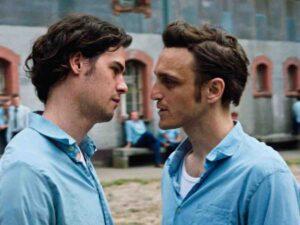An unflinchingly crafted prison drama based on true events, Great Freedom centers around an ill-starred individual Hans (Franz Rogowski), who is sent to prison straight from a concentration camp after World War II has ended. He endures much humiliation because of his homosexuality in a period when it was illegal in post-WWII Germany. Directed by Austrian filmmaker Sebastian Meise, the central theme of the film focuses on a journey of redemption and presents a blatant act of defiance against an unconstitutional system.
Though the film paints a grim picture of the disgraceful past of West Germany, the beauty of its narrative lies in the humanity shared between the two primary characters. The narrative displays a strong sense of political indignation, and despite the gritty reality of the treatment, this is a superbly done character portrait of two improbable fellow prisoners who find solace in one another’s company.
Without being melodramatic, the filmmaker focuses intently and with such feeling on the plight of these characters that the film becomes an observant piece of work. We’re remarkably led into their inner worlds as they grapple with the turmoil of being treated as outsiders in an otherwise civil society.
The film follows a non-linear storyline and begins in West Germany in 1968, which was a period of great political upheaval and forward-thinking reformations. Nonetheless, the social environment was hostile to gay men. We’re introduced to Hans in grainy, black-and-white footage, engaging in sexual encounters with men at different points in time, recorded secretly. Soon, we understand that the footage is being used against him in a courtroom with the intention of putting him behind bars.
Over the years, he’s repeatedly been sent to prison for displaying his rebellious side in the face of repressive homophobic legislation. While serving his sentence, he meets Viktor Kohl (Georg Friedrich), another prisoner he eventually befriends. When Hans and Viktor meet for the first time, they’re naturally apprehensive of one another.
Viktor, who is ostensibly straight, initially shows no love interest in Hans, and so a substantial psychological barrier mounts between them. But as years go by, they develop a bond. At first glance, the film appears to follow the conventional tropes of a gay love story. But as the dramatic events of the film unfold, we become observers of a rich tapestry of insightful observations. Their bond pulsates with an earnestness of shattered souls looking for redemption.
Although their friendship is strange, unconventional, and for the most part platonic, it’s fascinating to see their romance play out so intricately. They’re ecstatic to have just found each other while stuck in a terrible set-up that looks down on their relationship. Despite their different social backgrounds and ideologies, two completely different souls discover desire, love, and other commonalities.
The sexual scenes in the film don’t offer much room for fantasy. Hans and Viktor constantly face the prospect of violence, imprisonment, or even death, which puts their lives under close scrutiny. As a result, the film develops into a somber psychological examination of the impact of confinement and examines how love can survive under duress. What strikes a deeper chord is how structural oppression has crushed Hans‘ desire to pursue a life of freedom. To love someone in captivity is the only form of love he is now familiar with.
Meise and his co-writer, Thomas Reider, triumph in creating a compassionate prison drama that does not deal with a jail break, casual sexual violence, or cruelty. There are fights and altercations here, but not in the kind of exploitative ways that are typical of prison movies. Even the psychological turmoil that the protagonist experiences is handled with care and compassion. Although the prisoners abuse one another, there’s also a bond between them.
The state tries to dehumanize these guys by criminalizing both their impulses and their own personhood, which is where the film also acquires a political overtone. Meise’s approach is very subtle, and his style is greatly helped by Rogowski’s understated performance as the mistreated Hans. It’s one of those films where sharp direction and nuanced performances work in tandem to make the narrative engrossing.
Crystel Fournier’s cinematography brings an intimate insight into the lives of prisoners living in a confined space, with exquisite use of composition, lensing, and lighting. Editor Joana Scrinzi skilfully juxtaposes the various time periods of the film with an ease that helps the story progress seamlessly. Nile Rodgers and Peter Brötzmann’s musical composition amplifies the drama without exaggerating it. Production design by Michael Randel brings authenticity to the jail cells and gay bars of that period.
Undoubtedly, the plot of Great Freedom is excellent, but Rogowski’s acting is the real USP. His riveting performance has an amazing range, richly detailed and mesmerizing. When he first appears on screen, his fragility and weakness convey a great deal of the pain he’s been through. Later, he dominates the screen with a commanding presence. Even when the screenplay meanders midway through the film, it’s the performances of the lead actors that endow the story with subtle moments of connectedness.
The overall result is stunning filmmaking with a sensitivity that lingers even after the final scene has faded out.
